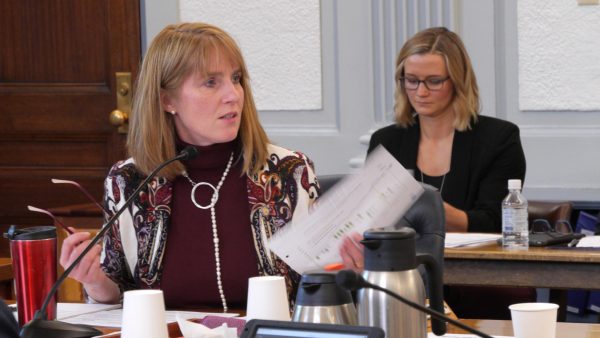
Gov. Mike Dunleavy’s administration plans to have commissioners play a more prominent role in the budget process this year.
Legislators are praising the Dunleavy administration’s plan. They’ve noted the department heads were closer to the policy implications of budget cuts than former budget director Donna Arduin.
Lawmakers also said they’re looking forward to learning what Dunleavy’s plans are for the budget.
Commissioners and their staffs have traditionally answered questions from legislators during the budget process. But the administration put Arduin and the Office of Management and Budget and at the center of the process this year, in some cases having OMB staff answer questions that commissioners would have in the past.
Senate Finance co-chair Natasha von Imhof, an Anchorage Republican, was among the lawmakers who asked for more access to the commissioners.
“We felt that the commissioners had a more holistic approach to their departments,” von Imhof said. “Not only did they have the fiscal issues in mind, but I think they had the policy issues.”
So von Imhof was encouraged when Dunleavy chief of staff Ben Stevens said on Monday that commissioners would play a more prominent role in the budget.
Stevens, in announcing that Arduin is no longer the budget director, said that the administration’s goal is for commissioners to be able to understand and defend their budgets.
“We now have 13 experienced commissioners that understand their budgets,” he said. “The governor and the commissioners and all of us involved in the budget process want to have input into the development of these budgets.”
Anchorage Democratic Sen. Bill Wielechowski, a Senate Finance Committee member, also was encouraged by the announcement.
“It’s going to result in commissioners participating,” she said. “And they’re the ones who really know their departments and divisions and what’s going on much, much better than some OMB director who has lived in Alaska for a couple months.”
Wielechowski said it was frustrating hearing Arduin’s answers to budget questions, when senators wanted to know more about what proposed cuts would mean.
“She would make these proposals and have no analysis at all on the impacts to Alaskans, the ramifications to various people across Alaska,” he said. “She just had no idea what was happening. And so by getting the commissioners more involved, you will have more input, you will have a better understanding, and it will help us pass better policy.”
North Pole Republican Rep. Tammie Wilson supports making deeper cuts to the budget. She was co-chair of the House Finance Committee before she left the majority caucus. She said it was difficult to justify cuts when the administration didn’t back them up with policy analysis — she said commissioners will be in a better position to provide that.
“There needed to be a plan,” she said. “And I think that’s what was missing this entire time. If we’re going to reduce an area by, let’s say, from four people to two people — well, if you continue to have all the same regulations and all the same mandates that four people had to take care of, how can two people do that?”
Wilson credited Arduin with providing an outline of what it will take to bring what the state spends in line with the money it brings in.
“What Miss Arduin was able to show is that, for us to get to a sustainable budget, here’s pretty much what it’s going to have to look like, almost like shock therapy,” she said.
Ultimately, lawmakers said that while having more involvement from commissioners will be important, they want to know the direction the governor gives them.
For her part, von Imhof said the biggest factor will be whether Dunleavy continues to propose deep cuts in order to provide full permanent fund dividends under a 1982 state law.
“I will be curious to see what the governor’s approach is come this December: whether he is going to continue with hundreds of millions (of dollars) of reductions across the board and hold the dividend harmless,” she said.
The deadline for Dunleavy to announce next year’s budget proposal is Dec. 15.
Andrew Kitchenman is the state government and politics reporter for Alaska Public Media and KTOO in Juneau. Reach him at akitchenman@alaskapublic.org.




